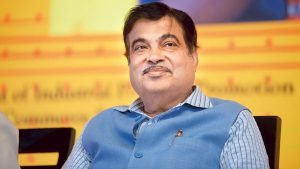Toll Sucks Life

Union Road Transport and Highways Minister Nitin Gadkari took everyone by surprise when at a function in Nagpur, where the RSS headquarters are located, he expressed concern over the “rising” number of poor. He said wealth was “getting concentrated” in the hands of some affluent people. He did not stop at that and went on to say there is a need for decentralisation of wealth and touched on a wide range of issues, including agriculture, manufacturing, taxation and public-private partnership in infrastructure development. In fact, he sounded like an Opposition leader when he said slowly the number of poor people is increasing and wealth is getting centralised in the hands of a few wealthy people. The timing and venue are significant as Gadkari is known to be among the few BJP leaders enjoying the trust of the top echelons of the RSS. The BJP is going through the motions of selecting a party president and the RSS would apparently like to have a man of its choice at the helm of the ruling party who can take on, if necessary, Prime Minister Narendra Modi and Union Home Minister Amit Shah. The new party president is to be appointed once the PM returns from his foreign tour on 10 July. The term of the current party president, JP Nadda, ended two years ago.
The announcement regarding the schedule for electing his successor is yet to be made. At this crucial juncture, Gadkari made remarks that virtually challenged the narrative dished out by the Prime Minister himself about the country’s trillions of dollars worth of economy when employment generation has gone back to the level that existed four decades ago. The Opposition has, for long, been crying foul against the BJP government for following economic policies that have brought about “jobless growth” in which the rich have grown richer and the poor poorer. Gadkari has virtually echoed this criticism of the Opposition by asserting that the economy must grow in a manner that creates jobs and uplifts rural areas. Driving home his point that reflects poorly on the government, he emphasized the need for further “decentralisation of wealth.”
He even heaped praise on former Prime Ministers PV Narasimha Rao and Dr Manmohan Singh for adopting liberal economic policies – a credit that the ruling dispensation is chary of giving – and at the same time cautioned against unchecked centralisation. The statistics that Gadkari reeled out are also an indictment of the government’s policies for the agricultural poor. He pointed out that manufacturing accounts for 22-24 per cent of the GDP, services 52-54 per cent, while agriculture, despite engaging 65-70 per cent of the rural population, contributes only around 12 per cent. What is even more significant is his reference to Swami Vivekananda – one of the icons the RSS worships – quoting his words: “Philosophy cannot be taught to someone whose stomach is empty.” Gadkari’s figures also go to show that while the biggest employment opportunities exist in agriculture, the focus of the government is far away and warped about this sector. Gadkari also praised his own work and achievement by claiming credit for infrastructure development. “I was the one who started the Build-Operate-Transfer system for road construction,” he said, a claim most would accept. To buttress his contention he said the earnings from Toll Booths are to the tune of Rs 55,000 crore and the income will go up to Rs 1.40 lakh crore in no time. While boasting about his immense collections in the Toll Booths spread across the country, Gadkari did not care to mention that such a massive amount of liquid cash getting regularly sucked out of the working economy also contributes to the growth of poverty and joblessness. He spoke about projects aimed at enhancing regional connectivity and investment.
On domestic investments, Gadkari said he has raised funds through Infrastructure Investment Trust (InvIT) bonds without foreign assistance. He asserted he was not accepting money from foreign countries “like Canada or the US.” He reminded the audience that the aim of the government is to reduce poverty and create jobs for the youth, and warned against economic liberalisation that could lead to the concentration of wealth in the hands of a few.
Clearly, Gadkari is not only resetting the party’s agenda but also insisting on course correction. The Pahalgam killings by terrorists and the subsequent military actions, mired in controversies with statements by top defence officers, have not enhanced the government’s image to the extent it was hoped for. In this backdrop, Gadkari’s re[1]marks, however controversial they may be in economic terms, point towards possibly big political stumbles.
News